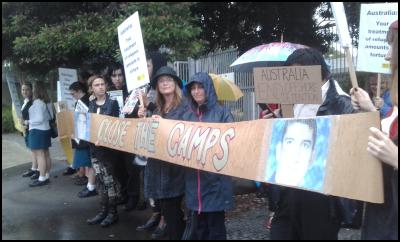Vigil for murdered asylum seeker coincides with Aus PM visit
17 February, 2017 for immediate release

(photo credit: Doing Our
Bit)
Vigil for murdered asylum seeker coincides with Turnbull visit
Dozens of Wellingtonians held a vigil outside the Australian High Commission on Friday to mark the third anniversary of the murder of Reza Berati.
Berati was 23 when he was killed while detained on Manus Island by the Australian government. His murder was the first of seven violent deaths in the last three years at the Nauru and Manus Island detention centres.
An organiser of the vigil had a message for Australian Prime Minister Malcolm Turnbull who was meeting New Zealand Prime Minister Bill English on the same day. “With or without Trump’s deal, you are responsible for the lives of these people who sought protection and who you have terrorised”, said Murdoch Stephens of Doing Our Bit. Stephens hoped that English would clearly state New Zealand’s opposition to these centres.
This is the third vigil on February 17th at the Australian High Commission to mark the murder of Berati and speakers included Green MP Denise Roche, and representatives from Amnesty New Zealand, and Peace Action Wellington.
“We had dearly hoped we wouldn’t have to be out here this year. These detention centres are a massive stain on Australia’s reputation and they need to be shut forever, genuine refugees given the protection they deserve and the whole business to be concluded,” said Stephens.
Many of the people on Nauru and Manus Island have been there since the detention centres were re-opened in late 2012.
“Can you imagine being imprisoned for five years even after you’ve been declared a genuine refugee? Almost 90% of those on Manus Island have been shown to be genuine and yet they are still locked up, separated from friends and family, without hope.”
Stephens said that the vigil had three aims. First, to show the Australian government that we think these South Pacific gulags are not welcome. Second, to show love and hope to Australian friends who have been struggling for human rights. Finally, to encourage the New Zealand government to make a public stand against mandatory detention for people seeking protection – refugees who've been vetted by the United Nations tests but still languish there.


 Gordon Campbell: On The New Pope, And The Israeli Attack On Peter Davis
Gordon Campbell: On The New Pope, And The Israeli Attack On Peter Davis New Zealand Police: Statement Regarding Jevon McSkimming
New Zealand Police: Statement Regarding Jevon McSkimming Climate Liberation Aotearoa: Climate Activist Draw Attention To Outdated Regulations Of Heli Tourism In Aoraki National Park
Climate Liberation Aotearoa: Climate Activist Draw Attention To Outdated Regulations Of Heli Tourism In Aoraki National Park The New Zealand Remembrance Army: Victoria Cross And Hardham Cup Come Together For First Time In Over 100-years
The New Zealand Remembrance Army: Victoria Cross And Hardham Cup Come Together For First Time In Over 100-years Queer Endurance in Defiance: Wellington Queer Communities Protest Against NZ First’s Anti-Trans Bill
Queer Endurance in Defiance: Wellington Queer Communities Protest Against NZ First’s Anti-Trans Bill Water New Zealand: Stormwater 2025 - Tackling Flooding And Storms To Build A Climate-Resilient Future
Water New Zealand: Stormwater 2025 - Tackling Flooding And Storms To Build A Climate-Resilient Future New Zealand Labour Party: Labour Asks Why Govt Is Silent On Gaza
New Zealand Labour Party: Labour Asks Why Govt Is Silent On Gaza


